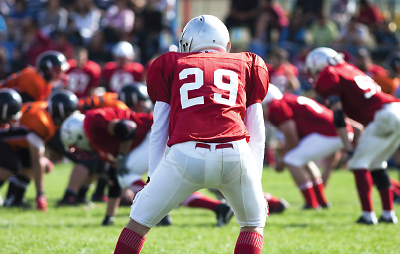Age When Football Hits Began May Determine Future Cognitive Problems
Abstract
An assessment of 42 former NFL players finds that those who started playing before age 12 perform worse on tests of thinking and memory.
A common view among the public is that football players (or other contact athletes) who develop cognitive problems later in life do so because they stayed in the game too long, that they should have retired just a couple of years earlier.

However, new research from Boston University (BU) School of Medicine is suggesting it’s not the length of time a football player absorbs physical punishment, but when he first started taking those hits that can prove the most damaging.
A team led by Robert Stern, Ph.D., a professor of neurology, neurosurgery, and anatomy and neurobiology as well as director of clinical research for BU’s Chronic Traumatic Encephalopathy Center, gave 42 former National Football League (NFL) players a battery of psychological tests. The report was published online in the journal Neurology.
The NFLers, who were aged 40 to 69 and had all experienced memory and cognition problems, were evenly divided based on one criterion: age of first exposure (AFE) to tackle football.
The players who started to play football before the age of 12 performed about 20 percent worse on these tests than the group that started at or after age 12.
That difference might just be due to a longer overall playing career and greater accumulation of head injuries (most of which would be mild enough to cause no symptoms). On average, the group that started playing football before age 12 played the game for almost 20 years, compared with 17.5 years for the players who started at or after age 12.
However, these same early starters had shorter NFL careers than their counterparts (about one-and-a-half years shorter on average), which may balance out some of that difference in total length.
These findings fall in line with research showing that the ages of 10 to 12 are a critical period of neurodevelopment, as highlighted by increased myelination—the insulating of nerve fibers—and cerebral blood flow.
“Research into the effects of mild, repetitive concussions is an area that is quite new, but we know that this type of injury is a different animal than a major blow that would knock you out cold,” said David Baron, D.O., vice chair of the Department of Psychiatry at the University of Southern California and director of the USC Center for Exercise, Psychiatry, and Sport.
“And right now, all the data is pointing to the increased susceptibility of a younger brain to these mild concussions,” he told Psychiatric News.
Stern did point out that “our study does not suggest that incurring a head injury after the age of 12 is safe or free from long-term consequences. Even though the early AFE group performed worse, the over-12 group still scored below average on several measures.”
All the players who participated in the study played all or a majority of their football prior to the recent public and league focus on traumatic brain injury (TBI), so children playing in today’s youth and school programs may be playing under safer conditions. But given that around 70 percent of all football players in the United States are under age 14, continued research into the short- and long-term effects of TBI in youth is warranted.
The study was supported by grants from the National Institutes of Health, and participant travel expenses were supported by gifts from JetBlue Airways, the NFL, and the NFL Players Association. ■



